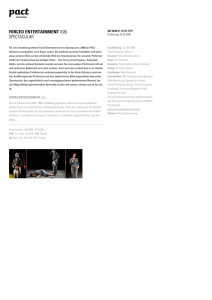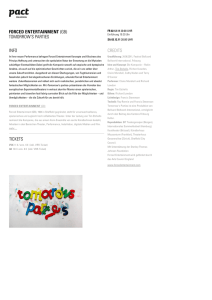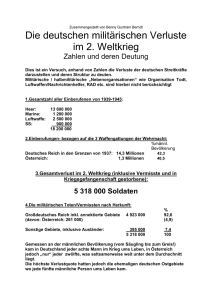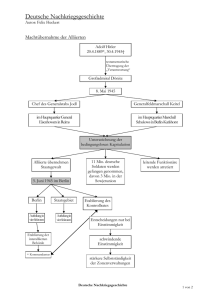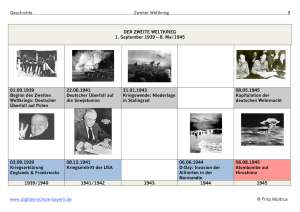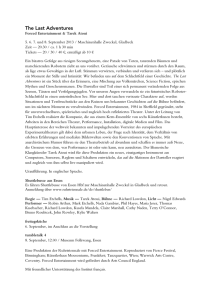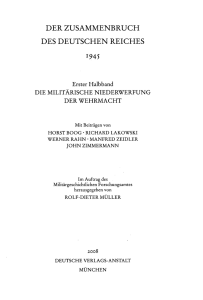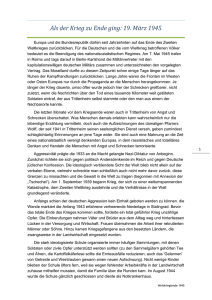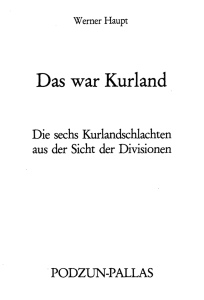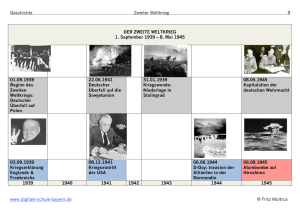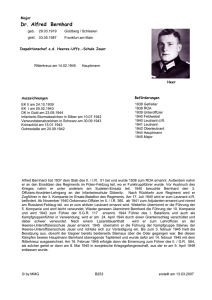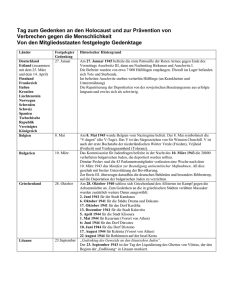Während des Zweiten Weltkrieges wurden millionenfach
Werbung
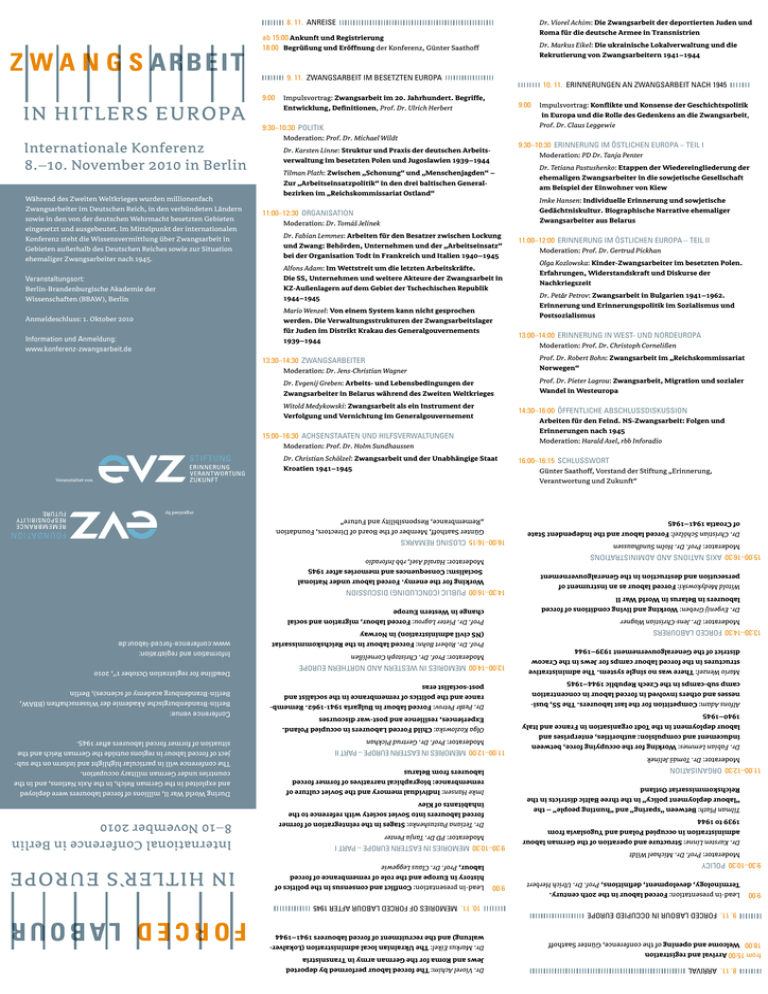
8. 11. Arrival from 15:00 Arrival and registration 18:00 Welcome and opening of the conference, Günter Saathoff 9. 11. Forced labour in occupied Europe 9:00 Lead-in presentation: Forced labour in the 20th century. Terminology, development, definitions, Prof. Dr. Ulrich Herbert 9:30–10:30 policy Moderator: Prof. Dr. Michael Wildt Dr. Karsten Linne: Structure and operation of the German labour administration in occupied Poland and Yugoslavia from 1939 to 1944 Tilman Plath: Between “sparing” and “hunting people” – the “labour deployment policy” in the three Baltic districts in the Reichskommissariat Ostland 11:00–12:30 Organisation Moderator: Dr. Tomáš Jelínek Mario Wenzel: There was no single system. The administrative structures in the forced labour camps for Jews in the Cracow district of the Generalgouvernement 1939–1944 Alfons Adam: Competition for the last labourers. The SS, businesses and others involved in forced labour in concentration camp sub-camps in the Czech Republic 1944–1945 Dr. Fabian Lemmes: Working for the occupying force, between inducement and compulsion: authorities, enterprises and labour deployment in the Todt organisation in France and Italy 1940–1945 13:30–14:30 Forced labourers Moderator: Dr. Jens-Christian Wagner Witold Medykowski: Forced labour as an instrument of persecution and destruction in the Generalgouvernement Dr. Evgenij Greben: Working and living conditions of forced labourers in Belarus in World War II 15:00–16:30 Axis Nations and administrations Moderator: Prof. Dr. Holm Sundhaussen Dr. Christian Schölzel: Forced labour and the Independent State of Croatia 1941–1945 Dr. Markus Eikel: The Ukrainian local administration (Lokalverwaltung) and the recruitment of forced labourers 1941–1944 Dr. Viorel Achim: The forced labour performed by deported Jews and Roma for the German army in Transnistria 10. 11. Memories of forced labour after 1945 9:00 Lead-in presentation: Conflict and consensus in the politics of history in Europe and the role of remembrance of forced labour, Prof. Dr. Claus Leggewie 9:30–10:30 Memories in Eastern Europe – part I Moderator: PD Dr. Tanja Penter Imke Hansen: Individual memory and the Soviet culture of remembrance: biographical narratives of former forced labourers from Belarus Dr. Tetiana Pastushenko: Stages in the reintegration of former forced labourers into Soviet society with reference to the inhabitants of Kiev 11:00–12:00 Memories in Eastern Europe – part II Moderator: Prof. Dr. Gertrud Pickhan Olga Kozlowska: Child Forced Labourers in occupied Poland. Experiences, resilience and post-war discourses Dr. Pet r Petrov: Forced labour in Bulgaria 1941-1962. Remembrance and the politics of remembrance in the socialist and post-socialist eras 13:00–14:00 Memories in Western and Northern Europe Moderator: Prof. Dr. Christoph Cornelißen Prof. Dr. Pieter Lagrou: Forced labour, migration and social change in Western Europe Prof. Dr. Robert Bohn: Forced labour in the Reichskommissariat (NS civil administration) in Norway During World War II, millions of forced labourers were deployed and exploited in the German Reich, in the Axis Nations, and in the countries under German military occupation. The conference will in particular highlight and inform on the subject of forced labour in regions outside the German Reich and the situation of former forced labourers after 1945. Conference venue: Berlin-Brandenburgische Akademie der Wissenschaften (BBAW, Berlin-Brandenburg academy of sciences), Berlin Deadline for registration October 1st, 2010 Information and registration: www.conference-forced-labour.de 14:30–16:00 Public (Concluding) discussion Working for the enemy. Forced labour under National Socialism: Consequences and memories after 1945 Moderator: Harald Asel, rbb Inforadio 16:00–16:15 closing remarks Günter Saathoff, Member of the Board of Directors, Foundation „Remembrance, Responsibility and Future“ organised by 16:00–16:15 Schlusswort Günter Saathoff, Vorstand der Stiftung „Erinnerung, Verantwortung und Zukunft“ Veranstaltet von Dr. Christian Schölzel: Zwangsarbeit und der Unabhängige Staat Kroatien 1941–1945 15:00–16:30 Achsenstaaten und Hilfsverwaltungen Moderation: Prof. Dr. Holm Sundhaussen Dr. Evgenij Greben: Arbeits- und Lebensbedingungen der Zwangsarbeiter in Belarus während des Zweiten Weltkrieges Witold Medykowski: Zwangsarbeit als ein Instrument der Verfolgung und Vernichtung im Generalgouvernement 14:30–16:00 Öffentliche Abschlussdiskussion Arbeiten für den Feind. NS-Zwangsarbeit: Folgen und Erinnerungen nach 1945 Moderation: Harald Asel, rbb Inforadio 13:30–14:30 Zwangsarbeiter Moderation: Dr. Jens-Christian Wagner Information und Anmeldung: www.konferenz-zwangsarbeit.de Anmeldeschluss: 1. Oktober 2010 Veranstaltungsort: Berlin-Brandenburgische Akademie der Wissenschaften (BBAW), Berlin Während des Zweiten Weltkrieges wurden millionenfach Zwangsarbeiter im Deutschen Reich, in den verbündeten Ländern sowie in den von der deutschen Wehrmacht besetzten Gebieten eingesetzt und ausgebeutet. Im Mittelpunkt der internationalen Konferenz steht die Wissensvermittlung über Zwangsarbeit in Gebieten außerhalb des Deutschen Reiches sowie zur Situation ehemaliger Zwangsarbeiter nach 1945. Dr. Fabian Lemmes: Arbeiten für den Besatzer zwischen Lockung und Zwang: Behör­den, Unternehmen und der „Arbeitseinsatz“ bei der Organisation Todt in Frankreich und Italien 1940–1945 Alfons Adam: Im Wettstreit um die letzten Arbeitskräfte. Die SS, U nternehmen und weitere Akteure der Zwangsarbeit in KZ-Außenlagern auf dem Gebiet der Tschechi­schen Republik 1944–1945 Mario Wenzel: Von einem System kann nicht gesprochen werden. Die Verwaltungs­strukturen der Zwangsarbeitslager für Juden im Distrikt Krakau des Generalgouver­nements 1939–1944 Dr. Karsten Linne: Struktur und Praxis der deutschen Arbeitsverwaltung im besetzten Polen und Jugoslawien 1939–1944 Tilman Plath: Zwischen „Schonung“ und „Menschenjagden“ – Zur „Arbeitseinsatzpolitik“ in den drei baltischen Generalbezirken im „Reichskommissariat Ostland“ Prof. Dr. Robert Bohn: Zwangsarbeit im „Reichskommissariat Norwegen“ Prof. Dr. Pieter Lagrou: Zwangsarbeit, Migration und sozialer Wandel in Westeuropa 13:00–14:00 Erinnerung in West- und Nordeuropa Moderation: Prof. Dr. Christoph Cornelißen 11:00–12:30 Organisation Moderation: Dr. Tomáš Jelínek Olga Kozlowska: Kinder-Zwangsarbeiter im besetzten Polen. Erfahrungen, Widerstandskraft und Diskurse der Nachkriegszeit Dr. Pet r Petrov: Zwangsarbeit in Bulgarien 1941–1962. Erinnerung und Erinnerungspolitik im Sozialismus und Postsozialismus 11:00–12:00 Erinnerung im östlichen Europa – Teil II Moderation: Prof. Dr. Gertrud Pickhan Dr. Tetiana Pastushenko: Etappen der Wiedereingliederung der ehemaligen Zwangs­arbeiter in die sowjetische Gesellschaft am Beispiel der Einwohner von Kiew Imke Hansen: Individuelle Erinnerung und sowjetische Gedächtniskultur. Biogra­phische Narrative ehemaliger Zwangsarbeiter aus Belarus 9:30–10:30 Erinnerung im östlichen Europa – Teil I Moderation: PD Dr. Tanja Penter 9:30–10:30 Politik Moderation: Prof. Dr. Michael Wildt 9:00 Impulsvortrag: Konflikte und Konsense der Geschichtspolitik in Europa und die Rolle des Gedenkens an die Zwangsarbeit, Prof. Dr. Claus Leggewie 9:00 Impulsvortrag: Zwangsarbeit im 20. Jahrhundert. Begriffe, Entwicklung, Definitionen, Prof. Dr. Ulrich Herbert 9. 11. Zwangsarbeit im besetzten Europa ab 15:00 Ankunft und Registrierung 18:00 Begrüßung und Eröffnung der Konferenz, Günter Saathoff 8. 11. Anreise Dr. Viorel Achim: Die Zwangsarbeit der deportierten Juden und Roma für die deutsche Armee in Transnistrien Dr. Markus Eikel: Die ukrainische Lokalverwaltung und die Rekrutierung von Zwangsarbeitern 1941–1944 10. 11. Erinnerungen an Zwangsarbeit nach 1945 Arbeiten für den Feind. NS-Zwangsarbeit: Folgen und Erinnerungen nach 1945 Moderation: Harald Asel, rbb Inforadio 10.11.2010, 14.30 bis 16.15 Uhr Öffentliche Abschlussdiskussion: Eintritt frei Ort: Berlin-Brandenburgische Akademie der Wissenschaften Markgrafenstraße 38, 10117 Berlin Veranstaltet von Information: www.konferenz-zwangsarbeit.de
